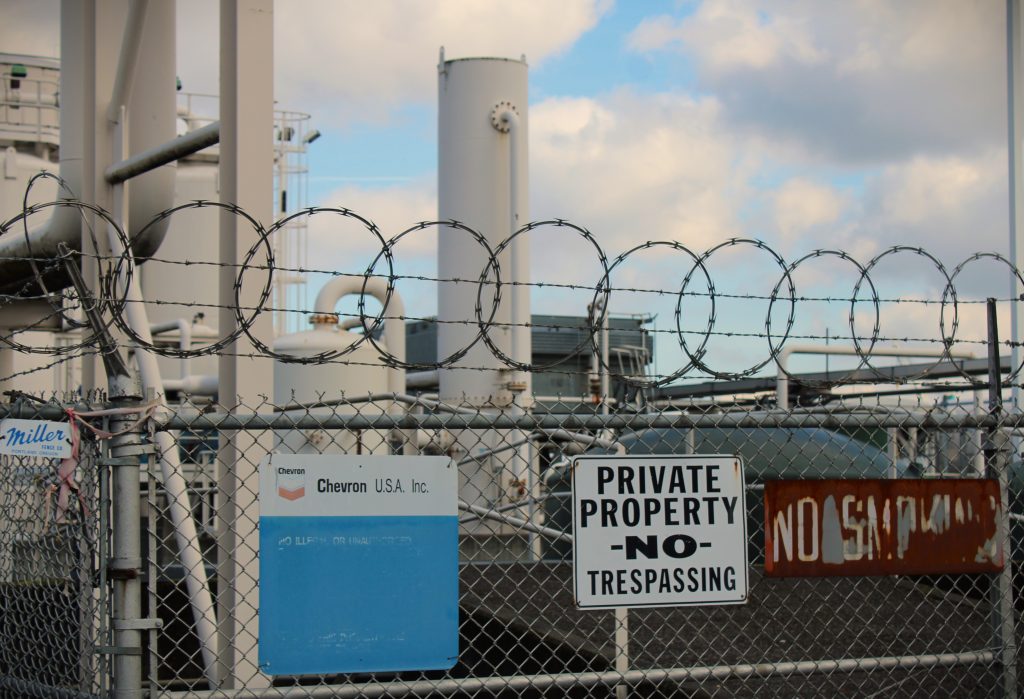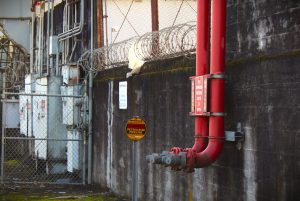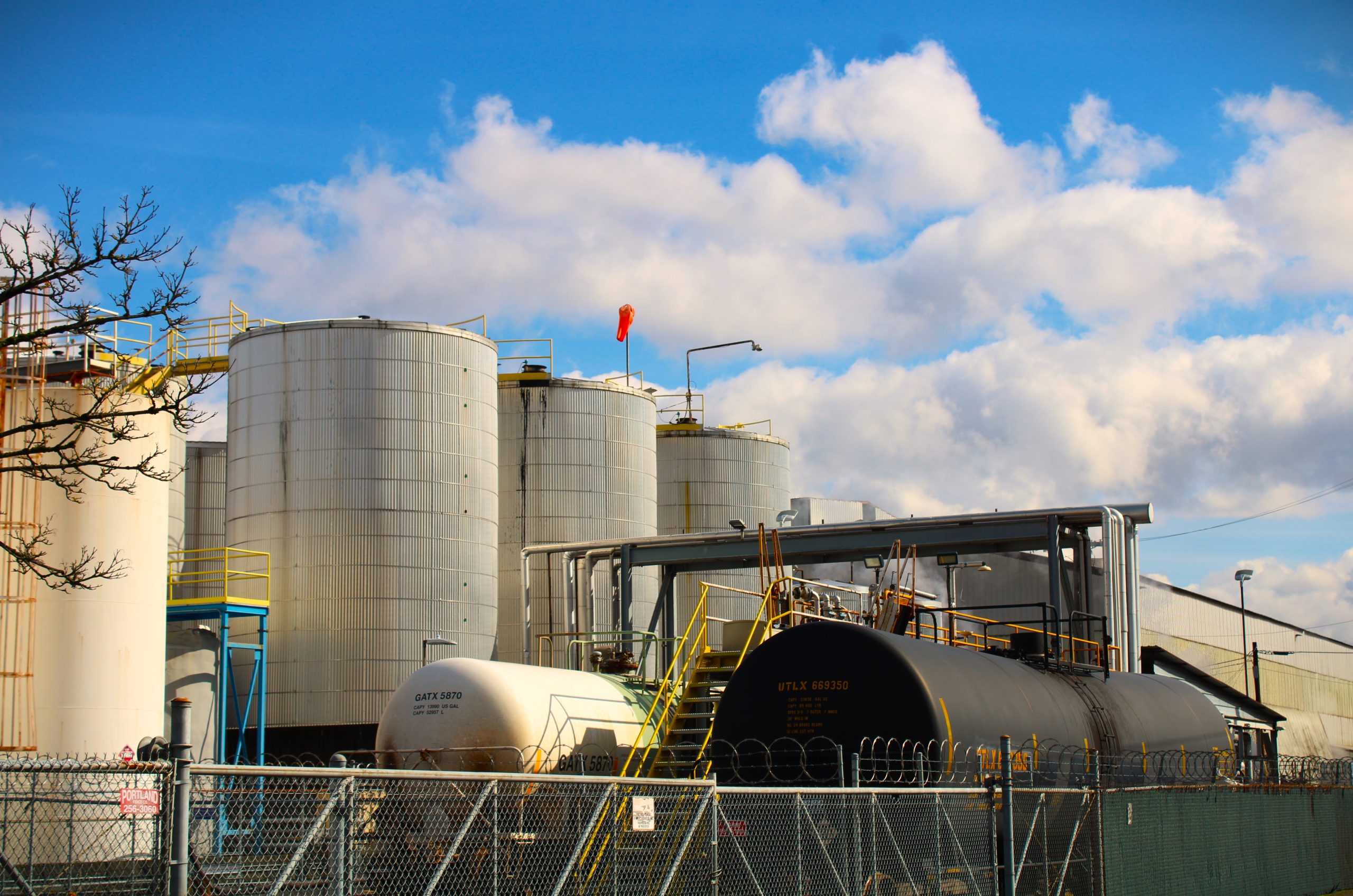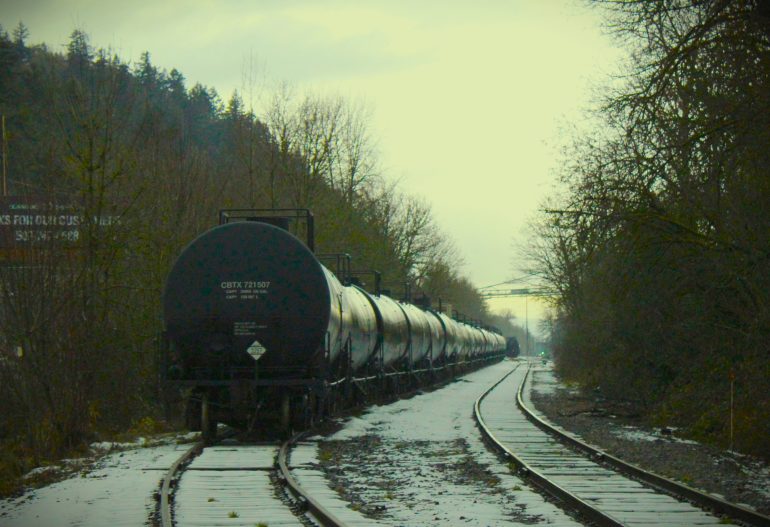Late in the evening on February 3, a train derailed in East Palestine, Ohio. Of the 141 railcars, 38 derailed, and 14 were carrying the potentially explosive, toxic gas vinyl chloride. Everyone within a mile radius of the small town of 5,000 were forced to evacuate, as Ohio Governor Mike DeWine warned of “the potential of a catastrophic tanker failure which could cause an explosion with the potential of deadly shrapnel traveling up to a mile.” It was like the “airborne toxic event” from the dark Don DeLillo book and absurdist Noah Baumbach film adaptation White Noise; a film that—to blur the line between art and life—was actually shot in towns near East Palestine two years earlier. The evacuation order was lifted after five days, but residents of East Palestine returned home to find some 3,500 fish dead in the waterways, sparking concerns of the long-term ecological and public health effects.
Could a disaster like this ever happen in Portland?
Just north of downtown Portland, where forests and waters interfaced for time immemorial, the Critical Energy Infrastructure Hub (CEI Hub) now houses in its 630 tanks more than 90% of all liquid fuel for the state of Oregon, including jet fuel for Portland International Airport. A Houston, Texas-based oil company, Zenith Energy regularly brings highly flammable Bakken crude and highly toxic tar sands oils by train to storage tanks at the CEI Hub, many of which were built in the 1950s. As far as anyone knows, they don’t transport vinyl chloride, but Zenith has historically tried to pull the wool over the public’s eyes since they started transporting oil through the former asphalt terminal in 2014, so a cynic might say no one knows for sure. It is reasonable to be skeptical of a wolf dressed as a lamb.

The train tracks run through the Linnton neighborhood between the edge of Forest Park and the shores of the Willamette River. Until the mid-1800s, the location was a seasonal lake, and a place of community, food, and medicine for Indigenous tribes. To this day, tribes retain water rights, but access to the river is effectively impossible. Because they are built on the soil of a former lake, the tanks are vulnerable to liquefaction—imagine sand bouncing on a speaker playing music—in the instance of a megathrust earthquake. Known colloquially as “The Big One”—a Richter-9-plus quake is statistically overdue in the Cascadia Subduction Zone off the Oregon Coast, and Portland community members have been trying to convince local leaders to act with appropriate urgency.
On June 3, 2016, roughly 70 miles from Portland, a train carrying Bakken crude oil derailed in Mosier, Oregon, spilling more than 45,000 gallons of oil and igniting a 14-hour firefight. The same type transported by Zenith, Bakken oil comes from a rock unit in Montana, North Dakota, and southern Saskatchewan Canada, and ignites at a lower temperature than other forms of crude oil. The 500-population town of Mosier was left without water for several days, and sewage had to be shipped to nearby Hood River for months. In a recent interview, Mosier mayor Arlene Burns said “the [cars] that were very close to the fire that were not leaking, they could have exploded in what’s called a bleve explosion, which is just so hot and pressured. The entire city would’ve been in the blast zone if one of these explosions had happened, as well as all four lanes of the freeway.”
In August of 2022, the City of Portland denied Zenith a Land Use Compatibility Statement (LUCS)—pronounced “lux”—citing potential impact on the environment and on historically marginalized groups. That permit is necessary for Zenith to renew an air quality permit from DEQ and continue doing business. In a decision lauded by activists at that time, Commissioner Dan Ryan stated, “it is time to stop kicking our declarations down the road of intention—and start acting with the urgency needed at this critical time in history.”
But in November, in his position as head of the Bureau of Development Services (BDS), Ryan gifted a new LUCS to Zenith after they made vague promises to transition to “renewable energy” over the course of the next five years. Community members remain skeptical. In 2019, Zenith had promised to reduce the amount of crude oil they transport through their terminals, but a February 2023 report showed crude oil transport had increased from 337 million gallons in 2021 to 374 million in 2022—an increase of 47 million gallons, or well over 100 trains per year.

City Commissioner Carmen Rubio took over BDS after the newly elected council took over in 2023, and in that role has the power to rescind the LUCS. Beyond a short meeting on January 17—including four activists, Rubio, Ryan, and about a dozen staffers—City Hall has refused to meet with community members to hear their concerns. According to public records, Rubio’s office did however coordinate with Zenith’s PR representatives prior to that meeting. Josie Moberg, a legal fellow with the grassroots climate advocacy group Breach Collective, was in the January meeting, and said it was abruptly cut off at the 30-minute mark despite the promise of an open-ended conversation. “The most information we got out of the meeting was how scared the city is of getting sued,” she said. “You can always cite fear of litigation when you’re citing industry over community, but that’s a very frustrating answer for the community to hear.”
For their part, community activists are primarily concerned with the long-term health risks of the CEI Hub, catastrophic failure in the instance of an earthquake, or a potentially explosive train derailment like those seen in East Palestine, or closer to home in Mosier. The United States sees a rough average of 1,700 train derailments per year, and while not all of those are carrying toxic material, the inherent risk is notable. According to the non-profit Oregon Physicians for Social Responsibility, 26% of Multnomah County residents are within a half-mile of a rail line that carries oil by rail. Black and Pacific-Islander residents are respectively 1.8 and 1.48 times more likely to live in an evacuation zone than white residents. Moberg is more concerned with those stakes than she is with the city’s legal battle. “Even five years from now, if they keep their LUCS, they’re going to be transporting all sorts of different flammable biodiesels,” Moberg said. “These things also warrant a huge conversation about public health and safety.”
After public testimony in the February 9 council meeting, Commissioner Rubio broke her silence and directly addressed activists in attendance. “As Commissioner Ryan made clear last year, Zenith will be expected to maintain compliance with full transparency and to ensure the agreements are actualized,” she said. Activists reflexively laughed in unison, knowing that Zenith has at no point been transparent in their business dealings with Portland.

In a February 15 email to me, Rubio’s office dodged questions, but wrote in a prepared statement that “the city cannot create a special procedure for one application,” then passed the buck to DEQ, state, county, and federal government. “I welcome more energy-sector innovation to demonstrate to us, and follow through on, a shift away from fossil fuels and toward cleaner fuels,” she stated. “Our time to act is closing. Our time to act together is now.”
Moberg says it is reasonable to argue that Zenith’s current and proposed activities pose too great a risk to public and environmental health. “People are genuinely scared for our families’ lives, watching Zenith oil trains weave through our neighborhoods daily,” she said. She also recognizes that there is an inherent tension between the severity of the problem and the minutiae necessary to dismantle it. “Yeah, maybe the LUCS isn’t the greatest tool ever. Maybe it’s boring. But Portland’s stuck with 90% of the petrol-based fuels in the state on our riverfront, and Zenith is going to be status quo doing that work. It does sound boring, but it’s also just outrageous—especially in a progressive city like Portland.”





